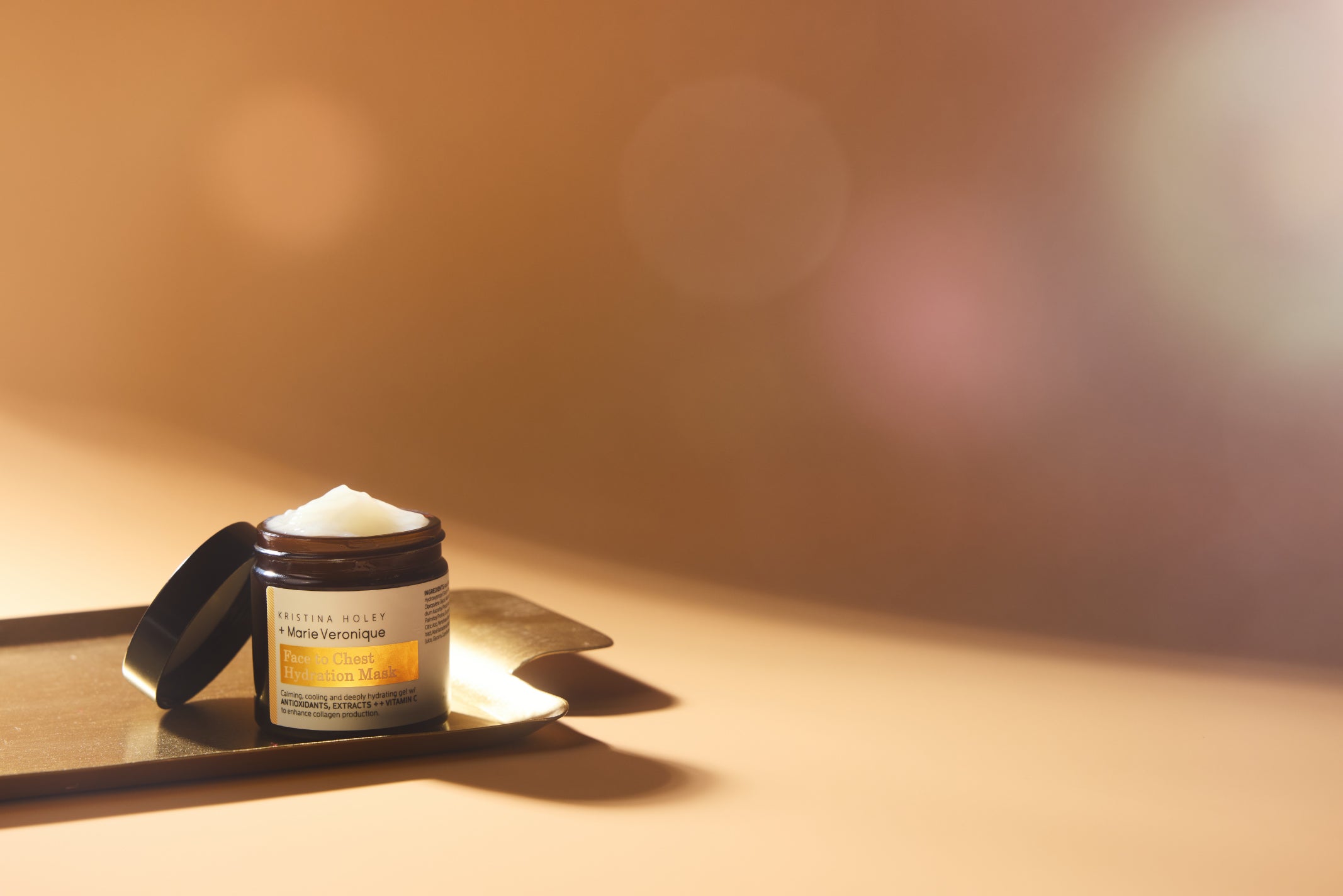FREE SHIPPING ON U.S. ORDERS OVER $65
FREE SHIPPING ON U.S. ORDERS OVER $65
Skin Health
Press
Where To Begin Quiz
How to Counter Heat for Cool, Calm Skin
by Marie Veronique Skin Experts
At Marie Veronique, we consider product formulation as a way to problem-solve. We're always watching the industry, noting trends in the treatment room, as well as at-home skin care. In recent years we’ve noticed an increase in clients who are experiencing symptoms related to heat in the skin, including redness, discoloration, and flushing.
This motivated us to think about all the ways we encounter heat on a regular basis and what to do when it impacts skin health. We’re so pleased to introduce our latest product, FACE TO CHEST HYDRATION MASK.
Aging Well: Guidance from 20 Years of Studying Skin Health
by Marie Veronique Skin Experts

In honor of our 20th anniversary, we took the opportunity to reflect and give you all our best knowledge and advice for getting and keeping your skin as healthy and beautiful as it can be at every stage of life. It also happens to be the advice we follow ourselves.
Answering Your Questions About Multi-Retinol Night Emulsion
by Marie Veronique Skin Experts

Addressing your most frequently asked questions about our latest product release, Multi-Retinol Night Emulsion.
Why We Made Multi-Retinol Night Emulsion
by Marie Veronique Skin Experts

Watch Founder Marie-Veronique Nadeau and Director of Skin Health Kristina Holey reflect on why we decided to create Multi-Retinol Night Emulsion.
Introducing the First Truly Clean, Microbiome-Friendly Alternative for Prescription Retinoids
by Marie Veronique Skin Experts

We are thrilled to unveil our latest product, a true innovation in skin health: Multi-Retinol Night Emulsion. This creamy, luxe night treatment offers a more intelligent and comprehensive way to address aging than anything currently on the market.
Created to address the need we saw in our ongoing work with clients for a highly effective, microbiome-friendly alternative to prescription retinoids, this product is designed to provide a smart, strategic way to address and heal the declining function that is characteristic of aging skin.
The Skin Microbiome and Science: Explorers on the New Frontier
by Marie Veronique

The second annual microbiome conference was held in San Francisco recently. The talks ranged from scientists investigating individual microbial species that call the skin microbiome their home, such as Staphylococcus aureus and Proprionibacterium acnes, to entrepreneurs with biome-based products designed to improve skin health.
Advances in Age-Defying Skincare: The Vitamin B3 Story
by Marie Veronique

We’re all familiar with hyped skin care ingredients that promise the moon—or at least subliminally suggest that we’ll look as if constantly bathed in moonlight with regular usage. Of course, some superhero ingredients, like retinol, stand the test of time. Others, like vitamin C derivatives SAP and MAP, have improved tremendously over their earlier versions thanks to excellent research and development. And others, like peptides, excited formulators at first, then disappointed once it became obvious that they weren’t living up to their original promise. Still others, like plant stem cells, were silly from the get-go—we are not plants, so it’s unclear how plant stem cells (undifferentiated cells that foster new cell growth) are supposed to improve mammalian skin. Plants and animals don’t even belong to the same Kingdom, so it’s a stretch.
Collagen + Aging Explained: Myths, Claims and Facts
by Marie Veronique

The role of collagen and its importance in maintaining beautiful skin is a topic that’s been dominating beauty news recently, no doubt because of the zillions of new treatments purporting to enhance collagen production and give your skin a smooth, youthful glow. Here, we examine the trendiest: collagen peptides applied topically, collagen peptides ingested and “collagen-induction” via microneedling.
Browse by Topic
Browse by Topic
Categories
- Acne
- Adult Acne
- Aging
- Anatomy + Physiology
- Ashley Neese
- Bacteriophages
- Barrier Function
- Beyond Topical
- Body
- Circulation
- Collagen
- Company News
- Conscious Breath
- Daphne Javitch
- Dermatitis
- Eczema
- Exfoliation
- Eye Care
- Hydration
- Hyperpigmentation
- Imperfect Wellness
- Ingredients
- Julia Sherman
- LED Light Therapy
- Lisa Levitt Gainsley
- Makeup
- Masks
- Men
- Pathogens
- Pregnancy
- Red Light Therapy
- Retinoids
- Romy Soleimani
- Rosacea
- Skin Health
- Skin Microbiome
- Sun Protection
- Unique Hammond
- Values
- Viruses
- Vitamin C
- Vitamin Therapy
- Winter
- Yogurt











